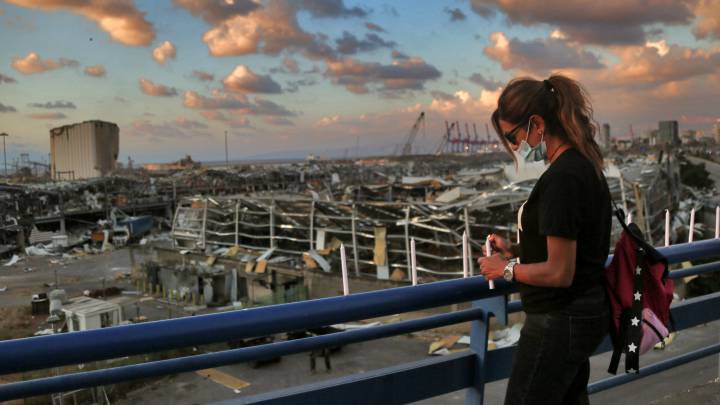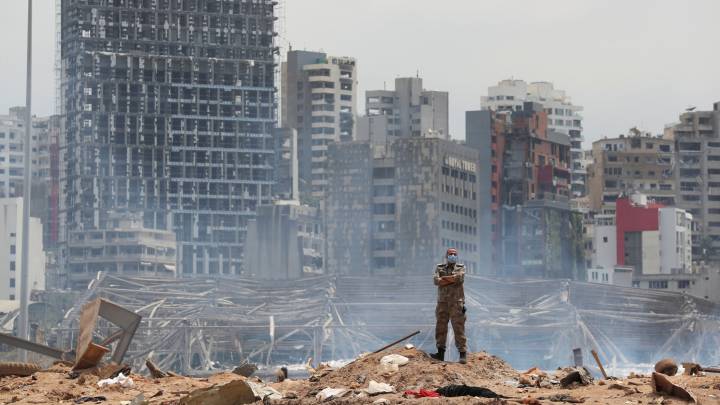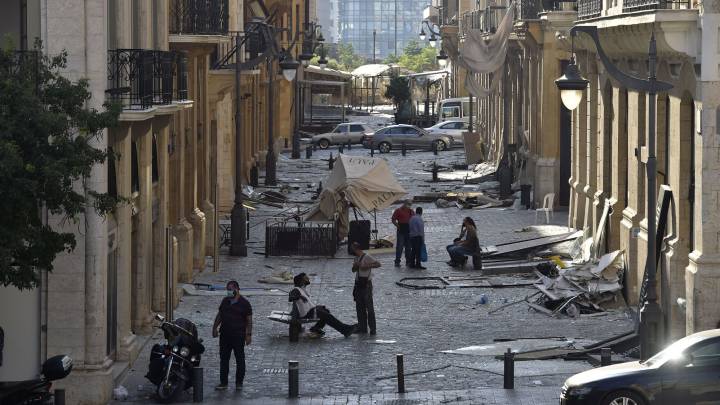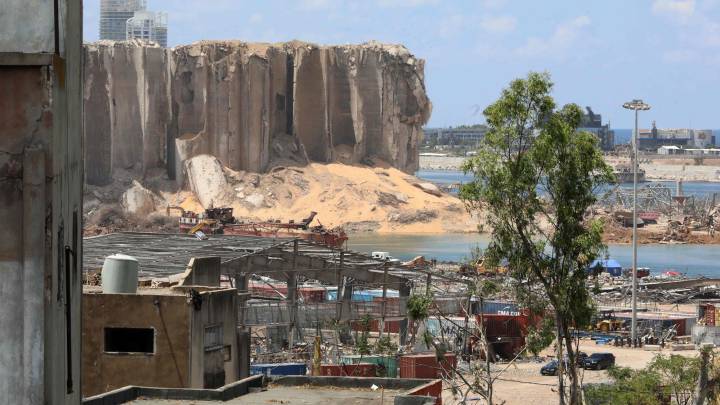Beirut explosion news summary for Tuesday 11 August
Latest updates from Beirut, which was devastated last Tuesday afternoon by a huge blast caused by the detonation of 2,750 tonnes of ammonium nitrate.
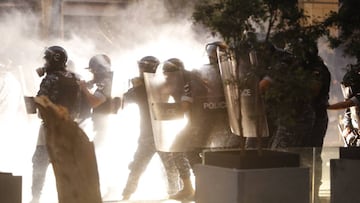
Show key events only
Beirut explosion: latest news - Tuesday 11 August
4k slow motion footage of the explosion
The power of the wave of devastation as it spreads out from the blast can be seen in this video - note the back of buildings, facing away from the blast, are torn to smithereens too.
Chef José Andrés is in Beirut
José Andrés is the founder of World Central Kitchen, a non-profit that provides meals in the wake of disasters.
Israel PM lauds French president
Israel's Prime Minister, Benjamin Netanyahu, was full of praise for French President Emmanuel Macron over his visit to Lebanon last week, when the Macron pledged to lead international relief efforts and organise an aid conference.
Netanyahu and Macron spoke in a call today, with the Israeli leader expressing "Israel’s willingness to give humanitarian aid." He also called for Hezbollah to remove missiles and explosive materials from populated areas and said that "if Hezbollah thinks they can solve the crisis in Lebanon by creating a crisis with Israel, this is a big mistake."
Death toll now stands at 171
A source within the Health Ministry told agency EFE that the current death toll from the explosion is now 171, with over 6,000 injured. The authorities are not currently updating the official figures.
Lebanon registers over 300 new Covid-19 cases
Amid the recovery effort from the explosion and the riots over the governments mishandling of the country, Lebanon recorded a record daily number of new Covid-19 infections today, with a further seven deaths from the coronavirus.
The country's tally now stands at 7,121 Covid-19 cases and 87 deaths since February, according to health ministry data. Even before the blast there had been a recent surge in infections.
Many hospitals were damaged in the explosion and staff were injured.
World Health Organization spokesman Tarik Jarasevic told a United Nations briefing in Geneva today that the displacement of so many people risks accelerating the spread of Covid-19.
"The emergency in Beirut has caused many Covid-19 precautionary measures to be relaxed, raising the prospects of even higher transmission rates and a large caseload in coming weeks," the U.N. Office for the Coordination of Humanitarian Affairs (OCHA) said in a report.
Container lines resume calls to Beirut
The terminal at Beirut report only sustained minor damage in the blast last Tuesday, meaning container lines are resuming calls to the port, leading companies have said. Ships had been being diverted to Lebanon’s second port at Tripoli to keep vital supply lines running.
"We are glad to advise that the container terminal suffered only minor damage and it has restarted operations,” German container line Hapag Lloyd said in a note to customers on Tuesday, adding that its first ship to call at Beirut since the disaster is due to dock on 14 August.
"Alongside our service reinstatement, we are also reopening booking acceptance for cargo to and from Beirut," the company said, adding that it was still evaluating the extent of damage to its containers that were in the port at the time of the blast.
French container line CMA CGM said separately on Tuesday it was fully operational again in Beirut, adding that its first container vessel had discharged in the port on Monday.

Protests continuing
Protesters next to a fire they've lit next to the parliament building in the centre of Beirut. There have been continued clashes between protesters and security forces.

Anger at the vigil
Sorrow and rage in equal measures at the vigil at the port in Beirut this evening.
Fixing the scars
As Romy Zahour Lauret says, she was one of the lucky one. And she's proud of the Lebanese people who are helping for free; as for the 'others' - she can barely bring herself to mention them.

A city still in mourning holds vigil
A crowd in Beirut have attended a vigil for the victims of the huge explosion in the Lebanese capital, which took place a week ago.
The attendees stood in silence near the remains of the port as a Muslim call to prayer sounded out and church bells tolled at 18:09, the precise moment the 2,750 tonnes of ammonium nitrate, unsafely stored at the port, exploded, killing over 200 people, injuring many thousands and causing over three billion dollars worth of damage.
UN aids Lebanon with 50,000 tonnes of wheat to avoid food crisis
Attempting to avert a food crisis
The explosion destroyed the grain silos at the docks, leaving Lebanon with just a few weeks supply of wheat flour. The World Food Programme is sending some three-months worth.
"Last night was violent"
"Last night was violent. The crowd was much smaller, a few hundred, but it started even before Hassan Diab's speech and they didn't even stop to listen to him," says France 24 reporter, Leila Molana-Allen. You can watch the report here...
Lebanese demand change after government quits over Beirut blast
(Reuters) Angry Lebanese said the government's resignation on Monday did not come close to addressing the tragedy of last week's Beirut explosion and demanded the removal of what they see as a corrupt ruling class to blame for the country's woes.
The blast at the Beirut port left a crater more than 100 metres across on dock nine, the French ambassador said on Twitter following a visit to the site by French forensic scientists supporting an investigation into the disaster.
A protest with the slogan "Bury the authorities first" was planned near the port, where highly explosive material stored for years detonated on Aug. 4, killing at least 171 people, injuring 6,000 and leaving hundreds of thousands homeless.
Prime Minister Hassan Diab, announcing his cabinet's resignation, blamed endemic graft for the explosion, the biggest in Beirut's history and which compounded a deep financial crisis that has collapsed the currency, paralysed the banking system and sent prices soaring.

A handout photo made available by the Lebanese Government shows Lebanon's President Michel Aoun (L) receiving resignation documents from Prime Minister Hassan Diab in Beirut, Lebanon, 10 August 2020 (issued on 11 August 2020). The Lebanese government resigned amid continuing protests over the Beirut port explosion last Tuesday. Dozens of people are still missing after the explosion. EFE/EPA/DALATI AND NOHRA/HANDOUT
17 tonnes of personal protective equipment have landed in Beirut from the WHO’s logistics hub in Dubai to be distributed to 23 public and private healthcare facilities. The supplies will protect health workers treating patients of the Beirut explosion from possible Covid-19 infection.

A woman walks past a damaged area in the aftermath of the massive explosion in Beirut last Tuesday. Protesters have beenclashing with security forces across the city amid calls for deep political and social change in Lebanon. The government resigned on Monday with Prime Minister Hassan Diab describing corruption in the country as "greater than the state." REUTERS/Thaier Al-Sudani
"Corruption is rooted in every juncture of the state"
(Reuters) Angry Lebanese said the government's resignation on Monday did not come near to addressing the tragedy of last week's Beirut explosion and demanded the removal of what they see as a corrupt ruling class to blame for the country's woes.
A protest with the slogan "Bury the authorities first" was planned near the port, where highly explosive material stored for years detonated on Aug. 4, killing at least 163 people, injuring 6,000 and leaving hundreds of thousands homeless.
Prime Minister Hassan Diab, announcing his cabinet's resignation, blamed endemic graft for the explosion, the biggest in Beirut's history and which compounded a deep financial crisis that has collapsed the currency, paralysed the banking system and forced up prices.
"I said before that corruption is rooted in every juncture of the state but I have discovered that corruption is greater than the state," he said, blaming the political elite for blocking reforms.
Egyptian Foreign Minister Sameh Shoukry has arrived in Beirut on an official visit, according to media reports. Egypt was among the first countries to offer its support after the tragedy.
Bloomberg report: "Customs officials first warned about the chemical in 2016. A warning was sent to the Public Works Ministry the very day the Port of Beirut blew up, and at least three other times this year, shunted from office to office, documents suggest."
World Food Programme to send 50,000 T of wheat flour to Lebanon
(Reuters) A report by the U.N. Office for the Coordination of Humanitarian Affairs (OCHA) released on Tuesday said the World Food Programme would be sending 50,000 tonnes of wheat flour to Beirut to stabilise Lebanon's wheat supply.
A Reuters report on Friday revealed Lebanon's government held no strategic stockpile of grain before last week's blast at the port and all privately held stocks at the country's only grain silo were destroyed in the explosion.
The flour will be sent "to stabilise the national supply and ensure there is no food shortage in the country," the report said.

An undated handout picture made available by the National Aeronautics and Space Administration (NASA) of a damage proxy map using satellite radar imagery showing the extent of the damage and help identify areas where people may need assistance after a devastating explosion on 04 August 2020 rocked the port area around Beirut, Lebanon (issued 11 August 2020). The map was created by scientists affiliated with NASA's Advanced Rapid Imaging and Analysis (ARIA) team and the Earth Observatory of Singapore (EOS). Dark red pixels represent the most severe damage, while orange and yellow areas are moderately or partially damaged. Each colored pixel represents an area of 30 square meters (about the size of a baseball diamond). EFE/EPA/NASA HANDOUT
Lebanon's leaders warned in July about explosives at port
(Reuters) Lebanese security officials warned the prime minister and president last month that 2,750 tonnes of ammonium nitrate stored in Beirut's port posed a security risk and could destroy the capital if it exploded, according to documents seen by Reuters and senior security sources.
Just over two weeks later, the industrial chemicals exploded in a massive blast that obliterated most of the port, killed at least 163 people, injured 6,000 more and destroyed some 6,000 buildings, according to municipal authorities.
A report by the General Directorate of State Security about events leading up to the explosion included a reference to a private letter sent to President Michel Aoun and Prime Minister Hassan Diab on July 20.
NASA satellite images show Beirut port destruction
In collaboration with the Earth Observatory of Singapore, NASA published satellite images of the port of Beirut with coloured pixels to show the damage cased by Tuesday's explosion. The red pixels denote the most serious damage, followed by orange and yellow. NASA were able to compare before and after images to determine changes in the landscape.
Lebanon's president accepts government resignation, asks it to stay on in caretaker capacity
Lebanese President Michel Aoun accepted the resignation of the prime minister's government on Monday following last week's devastating explosion in Beirut port and asked it to stay on temporarily, in a caretaker capacity until a new cabinet is formed, a televised announcement said.
Beirut explosion live coverage: welcome
Hello and welcome to our live coverage of the aftermath of last Tuesday’s blast in Beirut, which saw two huge explosions in the Lebanese capital’s port area, caused by the detonation of around 2,750 tonnes of ammonium nitrate.
The disaster has left at least 158 people dead, dozens missing and thousands injured and homeless.
